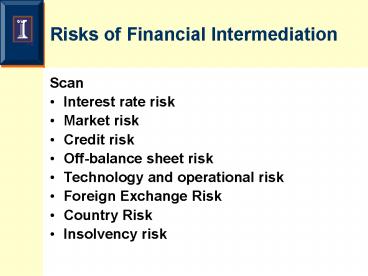Risks of Financial Intermediation
1 / 28
Title:
Risks of Financial Intermediation
Description:
or technology becomes obsolete. Operational Risk. The risks that ... Observable long term yields are 'average' of unobservable S.T. yields. Geometric average ... – PowerPoint PPT presentation
Number of Views:74
Avg rating:3.0/5.0
Title: Risks of Financial Intermediation
1
Risks of Financial Intermediation
- Scan
- Interest rate risk
- Market risk
- Credit risk
- Off-balance sheet risk
- Technology and operational risk
- Foreign Exchange Risk
- Country Risk
- Insolvency risk
2
Interest Rate Risk
- Refinancing risk
- Reinvestment risk
Risk incurred by an FI when maturities of its
assets and liabilities are mismatched
3
Market Risk
The risk incurred in the trading of assets and
liabilities due to changesin interest rates,
exchanged rates, and other asset prices.
4
Credit Risk
The risk that the promised cash flows from loans
and investments held by FIs may not be paid in
full.
5
Off balance sheet risk
The risk incurred by an FI due to activities
related to contingentassets and liabilities.
6
Technology risk
Technology RiskThe risks incurred by an FI when
technological investments do not produce the
cost savings anticipated or technology becomes
obsolete.
Operational RiskThe risks that existing
technologyor support systems may malfunction or
break down
7
Foreign exchange risk
Risks that foreign exchange rate changes can
affect the value of assets and liabilitieslocated
abroad.
8
Country risk
Risks that repayments from foreign borrowers may
be interrupted because of interferences from
foreign governments.
9
Liquidity risk
Risks that an FI will not have enough liquid
assets to operate.
10
Insolvency risk
Risks that an FI will not have enough capital to
offset a decline in the valueof its assets
relative to liabilities.
11
Interest Rate Fundamentals
12
Yield measurements
Difficulty with using this as a measure of
yield?
Discount vs. premium instruments
13
Corporate BondsWSJ Reporting
- Bonds Cur Vol Close Yld ATT 6s00 6.1 113
98ATT 8s10 9.0 115 ?ATT ?s06
9.4 120 74.5 - ATT name6 annual coupon00 maturity years
series (not important for us)6.1 coupon
payment divided by closing price98
closing pricecomplete table above
14
Yield to Maturity
- Simple terms rate of discount that makes the
present value of all cash flows equal to current
market price. - IRR
15
Bank Discount Yield
- Used with discount instrumentsUS T-bills,
commercial paper, bankers acceptances
- 2 Important Issues
- return is based on par
- 360 year
16
Interest rate fundamentals
- Why do yields differ across instruments at a
point in time? - time to maturity
- default risk
- marketability/liquidity
- callability/convertability
- taxability
- Why do yields on same instrument differ over
time? - Inflation
- Real interest rates
17
Real vs. Nominal Rates
- Fisher effect
- nominal rate real rate
- expected inflation
- (real rate x expected
inflation)
18
Term Structure of Yields
- Shape?
- Axis?
19
Term Structure of Yields(Theories)
- Market segmentation
- Liquidity preference or Premium Approach
- Unbiased ExpectationsObservable long term
yields are average of unobservable S.T.
yieldsGeometric average
20
Spot vs. Forward Rates
Number of periods
1 year forward rates
3r1
2r1
1r1
0r1
4r1
Initial timePeriod
Time 0
Time 1
Time 2
Time 3
Time 4
0R1
0R2
0R3
SpotRates
0R4
0R5
21
Pure Expectations
22
Pure Expectations Yield Curve
?
23
Forward Rates
24
Calculate
- Suppose the following are taken from yield curve.
What are the implied 1 year rates? - 1 yr -6.00
- 2 yr- 6.25
- 3 yr- 6.50
- 4 yr- 6.75
- 5 yr- 7.00
25
- Suppose that on Aug 31, a SL wished to purchase
a T-bill maturing Oct 1 (31 days). If the dealer
quotes a bank discount yield of 2.97 what must
the SL pay for the T-Bill? - Assume 100 par value
26
(No Transcript)
27
Sample
- Suppose we observe the 3 year Treasury security
rate to be 12, the expected one year rate next
year to be 8 and the expected one year rate the
following year to be 10. - What is the one-year Treasury Rate?
- R1 .1825
- 1.12 (1.1825)(1.08)(11.1)
1/3
28
(No Transcript)































